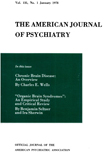EEG sleep changes as predictors in depression
Abstract
The authors conducted a study of 18 depressed patients to see whether EEG sleep measurements might provide a predictive tool for response to antidepressant medication. They found that although the sedative characteristics of amitriptyline did not differentiate good responders from poor responders until the third week of drug treatment, the good responders showed significant increases in REM latency, decreases in REM sleep time, decreases in REM sleep percent, and decreases in REM activity after only 2 nights of drug treatment.
Access content
To read the fulltext, please use one of the options below to sign in or purchase access.- Personal login
- Institutional Login
- Sign in via OpenAthens
- Register for access
-
Please login/register if you wish to pair your device and check access availability.
Not a subscriber?
PsychiatryOnline subscription options offer access to the DSM-5 library, books, journals, CME, and patient resources. This all-in-one virtual library provides psychiatrists and mental health professionals with key resources for diagnosis, treatment, research, and professional development.
Need more help? PsychiatryOnline Customer Service may be reached by emailing [email protected] or by calling 800-368-5777 (in the U.S.) or 703-907-7322 (outside the U.S.).



